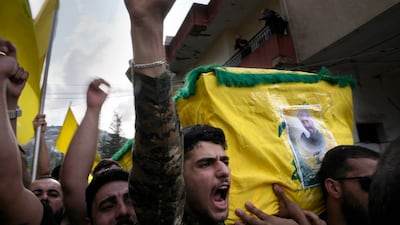Live updates: follow the latest on Israel-Gaza
France is "very concerned" over the threat of regional escalation as fighting between Israel and its sworn enemy Hezbollah along Lebanon's southern border has intensified in recent weeks, a French top diplomat told The National.
“The risk of an escalation is very important; diplomatic channels should prevail so that Lebanon is preserved from the opening of a new front in the south,” France's Ambassador for the Mediterranean Karim Amellal said.
Hezbollah, a powerful Iran-backed Lebanese militant group and political party, opened a pressure front against Israel on October 8, with the stated objective of supporting its ally Hamas and diverting Israeli forces from their offensive against the Palestinian militant group in Gaza.
In recent weeks, Israel has grown more aggressive in its attacks against Hezbollah along the disputed Israel-Lebanon border, threatening to launch a major military operation unless a long-term border agreement is achieved.
“I can tell you that the likelihood of [a war] happening in the coming months is much higher than it was in the past,” Israel's military chief Herzi Halevi said last week.
'We are very concerned about these statements: they do not seem to be conducive to a resolution through diplomatic means,” Mr Amellal said.
Israel wants Hezbollah's elite forces to pull back 40 kilometres from the UN-demarcated border and the creation of a buffer zone to allow the safe return of tens of thousands of residents who were evacuated from the north because of the fighting.
The areas along both sides of the border have been turned into quasi militarised zones, mostly emptied of civilians amid daily exchanges of fire.
More than 200 people have been killed in Lebanon, according to an AFP tally. The majority of them were members of groups attacking Israel, but the toll includes at least 26 civilians, three journalists, two rescuers and a Lebanese soldier. On the Israeli side, 15 people have been killed in the northern border area, including nine soldiers and six civilians, according to the Israeli army.
Against this backdrop, US-led diplomatic efforts have been intensified to avert a full-scale war in Lebanon. France, the former colonial power which has kept close ties with Lebanon, has also been involved.
Several top French officials have visited Beirut in recent weeks including Foreign Minister Catherine Colonna and Bernard Emie, the head of Fance's external intelligence service.
During his visit to Lebanon, Mr Amellal also met with Lebanon's caretaker Prime Minister Najib Mikati to discuss domestic and regional development.
“France is not sparing its efforts,” said Mr Amellal.
He stressed that the risk of escalation was at all-time high for the entire region, including the Red Sea, where Iran-backed Houthi militants have launched attacks on ships to disrupt maritime trade in response to Israel’s war on Gaza.
“It was to avoid further escalation that President Emmanuel Macron decided not to join the strikes by the American-British coalition against the Houthis,” he said, referring to the US-led military strikes on Houthi positions in Yemen since January 11.
'Balanced approach'
Mr Amellal praised what he called France's “balanced approach” to the crisis sparked by Hamas's unprecedented attack on October 7 in which about 1,200 people were killed in southern Israel.
More than three months months into its assault on Gaza in response, the Israeli army has caused mass destruction and killed more than 25,000 Palestinians – most of them women and children, according to local health authorities.
Mr Amellal said Paris strongly condemned the “terrorist” actions of Hamas, stressing France’s support for Israel as “a friendly and allied country.”
“As a nation marked by terrorism, we are extremely sensitive to the events of October 7,” he said.
On the other hand, Mr Amellal said France was also actively supporting Palestine by “calling for an immediate and durable ceasefire” in Gaza and providing humanitarian relief.
France has so far sent about 1,000 tonnes of aid into the enclave by land. In January, it delivered seven tonnes of aid to civilians and aid workers in an air drop carried out with Jordan.
Mr Amellal praised the EU initiative to impose sanctions on Israeli settlers responsible for “intolerable acts of violence” against Palestinians in the occupied West Bank.
The EU, whose members have been deeply divided in their approach to the war, has struggled to find a consensus on the issue.
With both the largest Muslim and Jewish communities in Europe, France has been socially and politically torn apart by the war in Gaza.
France's response to the Gaza war has been criticised for departing from its traditionally balanced position on the Israel-Palestinian question, as Mr Macron waited a month before calling for a ceasefire. More than 10,000 Palestinians had been killed by then.
In November, a dozen of French ambassadors to the Middle East and North Africa sent a letter to Mr Macron deploring his perceived pro-Israeli shift as detrimental to France’s image in the region.
“I acknowledge the disappointment,” Mr Amellal said, while pointing out that France's position had sparked criticism from both sides.
He said Paris was still “engaging in favour of this two-state solution” between Israel the occupied Palestinian territories.
“This is only possible outcome. Some say that it is idealistic, but what is the alternative to two states living in peace and security side by side,” he said.
The US, a staunch supporter of Israel, has also advocated for renewed negotiations on a two-state solution, a proposal that Israeli Prime Minister Benjamin Netanyahu has consistently rejected.
Regarding the scenario after the Gaza war, Mr Amellal said that “ultimately, it's up to Israelis and the Palestinians, our job is to create the conditions for dialogue”.
















